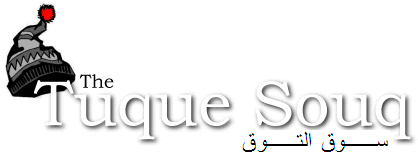On newsstands at this very moment, The Walrus magazine is profiling the much-maligned Al-Jazeera English (AJE) satellite news channel with a chronicle of the network's trials to become a big boy of global English-language media. The article, "The Most Hated Name in News," is by National Magazine Award-winning writer Deborah Campbell.
It's definitely worth a read if you haven't followed AJE's ordeal to get past the CRTC and other skeptics in Canada.
Favourite quote of the article: "Citizen journalism is like citizen dentistry."
Favourite insinuation that North American news media is a black hole: That if only AJE could break into the North American market its only rival on the global stage would be BBC World, which ironically is barely available in the North American market.
However, the article may leave the reader wanting for more than a peripheral glimpse of AJE.
For example, the article's central character is described as launching "a kind of pre-emptive strike to address concerns about AJE as it applied for a broadcast license from the CRTC." What were those concerns? The article later implies that it was completely due to perceptions of an anti-Israel bias. Makes sense, but where's the proof?
The CRTC's guidelines for issuing a license to a non-Canadian media outlet includes the following:
"Absent clear evidence, as determined by the Commission, that a non-Canadian news service would violate Canadian regulations, such as those regarding abusive comment, the Commission will be predisposed to authorize non-Canadian news services for distribution in Canada."
This was not cited in the article, to its detriment. Has anyone chronicled "abusive comment" by AJE? Did anyone besides pro-Israel groups protest? How has the CRTC engaged each side of the debate?
Regrettably, the article also misses the opportunity to address another burning question: what is the relationship between Al Jazeera English and Al Jazeera Arabic? Is there different content and approach to news? Are critics lambasting AJE for what AJA does in its reporting? The CRTC approved AJA in 2004 and has been monitoring it ever since--what has it found? Is AJA a hate-mongerer, or are its Canadian critics merely Arabophobes?
80% of the important info in the Walrus article--including the same interviewees--can be found in this April Globe and Mail article, at one-tenth the word count.
 Give us more, oh Walrus. Tackle harder.*
Give us more, oh Walrus. Tackle harder.*
In related news, the article did pique the Tuque Souq's interest on at least one other peripheral topic: Why the hell is Al-Jazeera banned in Tunisia? This new article from the Committee to Protect Journalists explains the ongoing war between AJA and the otherwise happy-go-luckiers of Tunisia.
Also, in almost totally unrelated news, the new Walrus issue also has a great piece on the making of Just for Laughs gags. They really never get old!
* The Tuque Souq recommends supporting The Walrus (and lots of other Canadian magazines) by taking out a subscription for you and your loved ones, so the Walrus can give us more.
It's definitely worth a read if you haven't followed AJE's ordeal to get past the CRTC and other skeptics in Canada.
Favourite quote of the article: "Citizen journalism is like citizen dentistry."
Favourite insinuation that North American news media is a black hole: That if only AJE could break into the North American market its only rival on the global stage would be BBC World, which ironically is barely available in the North American market.
However, the article may leave the reader wanting for more than a peripheral glimpse of AJE.
For example, the article's central character is described as launching "a kind of pre-emptive strike to address concerns about AJE as it applied for a broadcast license from the CRTC." What were those concerns? The article later implies that it was completely due to perceptions of an anti-Israel bias. Makes sense, but where's the proof?
The CRTC's guidelines for issuing a license to a non-Canadian media outlet includes the following:
"Absent clear evidence, as determined by the Commission, that a non-Canadian news service would violate Canadian regulations, such as those regarding abusive comment, the Commission will be predisposed to authorize non-Canadian news services for distribution in Canada."
This was not cited in the article, to its detriment. Has anyone chronicled "abusive comment" by AJE? Did anyone besides pro-Israel groups protest? How has the CRTC engaged each side of the debate?
Regrettably, the article also misses the opportunity to address another burning question: what is the relationship between Al Jazeera English and Al Jazeera Arabic? Is there different content and approach to news? Are critics lambasting AJE for what AJA does in its reporting? The CRTC approved AJA in 2004 and has been monitoring it ever since--what has it found? Is AJA a hate-mongerer, or are its Canadian critics merely Arabophobes?
80% of the important info in the Walrus article--including the same interviewees--can be found in this April Globe and Mail article, at one-tenth the word count.
 Give us more, oh Walrus. Tackle harder.*
Give us more, oh Walrus. Tackle harder.*In related news, the article did pique the Tuque Souq's interest on at least one other peripheral topic: Why the hell is Al-Jazeera banned in Tunisia? This new article from the Committee to Protect Journalists explains the ongoing war between AJA and the otherwise happy-go-luckiers of Tunisia.
Also, in almost totally unrelated news, the new Walrus issue also has a great piece on the making of Just for Laughs gags. They really never get old!
* The Tuque Souq recommends supporting The Walrus (and lots of other Canadian magazines) by taking out a subscription for you and your loved ones, so the Walrus can give us more.


No comments:
Post a Comment